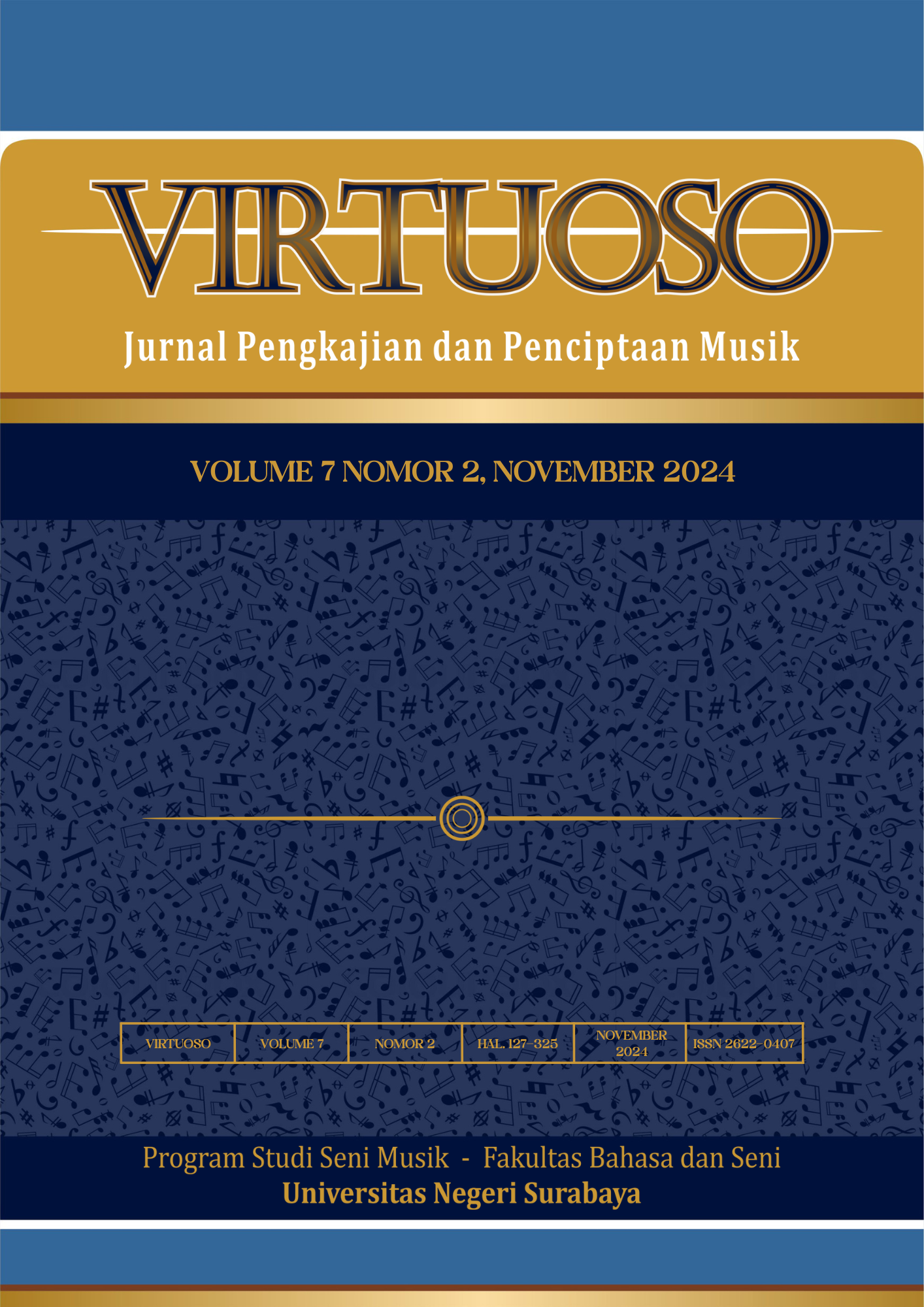Music Performance Pedagogy: Self-Regulation in Contrabass Practice
Main Article Content
Abstract
Downloads
Article Details

This work is licensed under a Creative Commons Attribution-NonCommercial-ShareAlike 4.0 International License.
The copyright of the received article once accepted for publication shall be assigned to the journal as the publisher of the journal. The intended copyright includes the right to publish the article in various forms (including reprints). The journal maintains the publishing rights to the published articles.
References
Alves, A. C., & Nogueira, M. (2024). Embodiment Consciousness in Music Performance Pedagogy. Empirical Musicology Review, 19(1), Article 1. https://doi.org/10.18061/emr.v19i1.9571
Bingham, H. H. (2024). A Caring Perspective on Collaborative Teaching in Music Education [Dissertation]. Boston University.
Bonneville-Roussy, A., & Bouffard, T. (2015). When quantity is not enough: Disentangling the roles of practice time, self-regulation and deliberate practice in musical achievement. Psychology of Music, 43(5), 686–704. https://doi.org/10.1177/0305735614534910
Braun, J. (2020). An Overview of Pedagogical Materials for the Double Bass. American String Teacher, 70(3), 27–32. https://doi.org/10.1177/0003131320933222
Dogantan-Dack, M. (2012). The art research in live music performance. Music Performance Research, 5.
Evans, P. (2023). Motivation and Self-Regulation in Music, Musicians, and Music Education. In R. M. Ryan (Ed.), The Oxford Handbook of Self-Determination Theory (pp. 638–664). Oxford University Press. https://doi.org/10.1093/oxfordhb/9780197600047.013.32
Griffin, P., & Care, E. (Eds.). (2015). Assessment and teaching of 21st Century Skills: Methods and approach. Springer. https://doi.org/10.1007/978-94-017-9395-7
Hallam, S. (2004). How important is practicing as a predictor of learning outcomes in instrumental music? Learning, 4, 1–76.
Hambrick, D. Z., Oswald, F. L., Altmann, E. M., Meinz, E. J., Gobet, F., & Campitelli, G. (2014). Deliberate practice: Is that all it takes to become an expert? Intelligence, 45, 34–45. https://doi.org/10.1016/j.intell.2013.04.001
Hastings, D. M. (2017). “With grace under pressure”: How critique as signature pedagogy fosters effective music performance. Arts and Humanities in Higher Education, 16(3), 252–265. https://doi.org/10.1177/1474022216652772
Hatfield, J. L., Halvari, H., & Lemyre, P.-N. (2017). Instrumental practice in the contemporary music academy: A three-phase cycle of Self-Regulated Learning in music students. Musicae Scientiae, 21(3), 316–337. https://doi.org/10.1177/1029864916658342
Kraemer, D. (1997). Don’t Lecture Me: A Case Study of Performance Pedagogy. English Education, 29(3), 173–182.
Lehmann, A. C., & Ericsson, K. A. (1997). Research on expert performance and deliberate practice: Implications for the education of amateur musicians and music students. Psychomusicology: A Journal of Research in Music Cognition, 16(1–2), 40–58. https://doi.org/10.1037/h0094068
Leon-Guerrero, A. (2008). Self-regulation strategies used by student musicians during music practice. Music Education Research, 10(1), 91–106. https://doi.org/10.1080/14613800701871439
Loewenberg Ball, D., Thames, M. H., & Phelps, G. (2008). Content Knowledge for Teaching: What Makes It Special? Journal of Teacher Education, 59(5), 389–407. https://doi.org/10.1177/0022487108324554
López-Calatayud, F., & Tejada, J. (2024). Self-regulation strategies and behaviors in the initial learning of the viola and violin with the support of software for real-time instrumental intonation assessment. Research Studies in Music Education, 46(1), 48–65. https://doi.org/10.1177/1321103X221128733
Macnamara, B. N., Hambrick, D. Z., & Oswald, F. L. (2014). Deliberate Practice and Performance in Music, Games, Sports, Education, and Professions: A Meta-Analysis. Psychological Science, 25(8), 1608–1618. https://doi.org/10.1177/0956797614535810
Mazur, Z., & Laguna, M. (2019). The role of affect in practicing a musical instrument: A systematic review of the literature. Psychology of Music, 47(6), 848–863. https://doi.org/10.1177/0305735619861831
McPherson, G. E. (Ed.). (2022). The Oxford handbook of music performance (1st ed., Vol. 1). Oxford University Press. https://doi.org/10.1093/oxfordhb/9780190056285.001.0001
McPherson, G. E., & McCormick, J. (1999). Motivational and Self-Regulated Learning Components of Musical Practice. Bulletin of the Council for Research in Music Education, 141, 98–102.
McPherson, G. E., Osborne, M. S., Evans, P., & Miksza, P. (2019). Applying self-regulated learning microanalysis to study musicians’ practice. Psychology of Music, 47(1), 18–32. https://doi.org/10.1177/0305735617731614
McPherson, Gary. E., Miksza, P., & Evans, P. (Eds.). (2017). Self-regulated learning in music practice and performance. In Handbook of self-regulation of learning and performance (pp. 181–193). Routledge.
Mieder, K., & Bugos, J. A. (2017). Enhancing self-regulated practice behavior in high school instrumentalists. International Journal of Music Education, 35(4), 578–587. https://doi.org/10.1177/0255761417689921
Nielsen, S. (2001). Self-regulating Learning Strategies in Instrumental Music Practice. Music Education Research, 3(2), 155–167. https://doi.org/10.1080/14613800120089223
Palmer, C., & Meyer, R. K. (2000). Conceptual and Motor Learning in Music Performance. Psychological Science, 11(1), 63–68. https://doi.org/10.1111/1467-9280.00216
Parkes, K. A. (2024). Assessment of Learning, for Learning, and as Learning in the Applied Music Studio. In The Applied Studio Model in Higher Music Education. Routledge.
Pucihar, A. K., & Pance, B. R. (2024). Designing a collaborative micro-environment for flute beginners in Slovenian music schools. In Music Schools in Changing Societies. Routledge.
Ray, S. (2015). Pedagogia da Performance Musical [Unpublished post-doctoral dissertation].
Saccardi, D. J. (2023). Research-to-Resource: Peer-Assisted Learning in the Music Program. Update: Applications of Research in Music Education, 41(2), 15–19. https://doi.org/10.1177/87551233221084366
Shively, J. (2015). Constructivism in music education. Arts Education Policy Review, 116(3), 128–136. https://doi.org/10.1080/10632913.2015.1011815
Simones, L. L. (2017). Beyond expectations in music performance modules in higher education: Rethinking instrumental and vocal music pedagogy for the twenty-first century. Music Education Research, 19(3), 252–262. https://doi.org/10.1080/14613808.2015.1122750
Varela, W., Abrami, P. C., & Upitis, R. (2016). Self-regulation and music learning: A systematic review. Psychology of Music, 44(1), 55–74. https://doi.org/10.1177/0305735614554639
Woody, R. H. (2000). Learning Expressivity in Music Performance: An Exploratory Study. Research Studies in Music Education, 14(1), 14–23. https://doi.org/10.1177/1321103X0001400102
Yin, R. K. (2018). Case study research and applications: Design and methods (Sixth edition). SAGE.
Zelenak, M. S. (2024). Self-efficacy and music performance: A meta-analysis. Psychology of Music, 52(6), 649–667. https://doi.org/10.1177/03057356231222432

